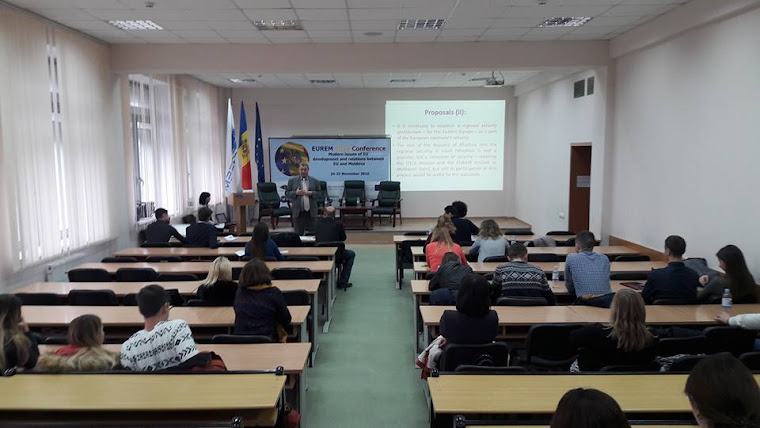The European Union as a
collective of its member states is concerned with conflicts from its
neighborhood, because the security from this area is a condition of its own
security and wealth (prosperity). The EU is vitally interested in having as
neighbors a community of values, such as democracy, human rights, rule of law
etc., which is a guaranty for stable development and for modernization of any
country.
Among the EU neighbors
are fragile and conflict-affected countries. There is direct link between
notions of fragile and conflict-affected. It looks like it is
an axiom that every conflict-affected state first was fragile. Fragility means
the existence is a multitude of internal vulnerabilities that increase risks
and threats from abroad. One of such states is the Republic of Moldova Moldova is placed
between Belarus , integrated
into the geopolitical space controlled by Russia,
and Ukraine Republic of Moldova
there is a president – an exponent of about half of the electorate, who speaks
for deep relations with the Russian
Federation
The specificity of the
Moldovan case concerns some elements that may seem odd: the presence of
Moldovan duty free shops at the Moldova – Ukrainian border, on Transnistrian
segment, the hosting in Chisinau and providing protection to the former
president of the unrecognized Transnistrian republic by the Chisinau authorities
and other. Based on these, some analysts say that in fact there is no a
Transnistrian conflict, there are very good relations between the elites from
Chisinau and Tiraspol Dniester
River Tiraspol is a multiple champion
of the Republic
of Moldova
The European Union has
clear interests in stabilizing its Eastern neighborhood. However, since now,
its action beyond its boundaries has been limited. The experience from the
Eastern Partnership Program showed that the financial assistance – for governments of neighboring countries,
which declared themselves „pro-European integration”, but in fact are suspected
of corruption and embezzlement by domestic societies and by international
actors – is not quite effective in helping the societies from those countries.
EU must find other, more effective, ways to contribute to the stabilization and
modernization of those countries. Understanding very well that the conflicts
outside the Union, at the EU borders, are dangerous and are potential outbreaks
for the EU destabilization, Brussels must participate in conflict management
and in conflict resolution – in finding solutions for the conflicts and
solutions in order to help neighboring countries to become “normal” – i.e. not
fragile (it is about to change the state status).
Undoubtedly, EU must
have an efficient approach to conflicts and crises in fragile – conflict-affected
countries, to contribute to their development, by designing and applying a
common strategic vision of conflict prevention (before crisis emerged or
violence erupts). From the perspective of societies from the Eastern European
countries, which want to become parts of the European family, EU is the only
supporter, which can help by imposing conditions on authorities from their own
countries.
Still, the European
Neighborhood Policy and the European Security Strategy must take into account
the specificity of fragile states, which, in many cases are captured (the state
institutions are captured by some oligarchic groups). Often, to help from
outside a captured state means to help the oligarchic regime from that state.
An efficient engagement
of the EU in a fragile – conflict-affected country, in exchange for financial assistance, without which it can not survive, would be the takeover of the
Anti-Corruption Center
by EU representatives and the creation of an Anti-Corruption Court Anti-Corruption Center Moldova
The EU is an important actor, which
plays and will play a special role in regional and in global context in
conflict management, conflict resolution, but first – in conflict prevention.
That is why it is important for Brussels
Under the new conditions, the EU,
together with Ukraine
